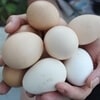Sure it might be easy to live off the land when you have 20 acres at your doorstep, but what can the rest of us do when it’s only a few paces to the back fence?
With some clever thinking and some readjustment on how we see our outdoor urban spaces, we urbanites can also live the good life whilst still having a life!
Fresh eggs for protein
Free range, fresh eggs are something very easy to produce in town. Keeping chickens in town is the ‘new black’ as more and more families realise how easy, fun and rewarding it can be. Chooks are the best eco pet. Not only do you get fresh eggs but you also get feathered gardeners, compost makers, fresh manure parcels and garbage disposals to boot. Councils are pro people keeping a few chooks in their backyard as long as some simple regulations are followed. The most obvious being no roosters. A family only require around 3 chooks to keep them in eggs. Three chooks will produce around 15 eggs a week for a good part of the year.
A small townhouse garden could accommodate some bantams. Being half the size of hens they require less space and will still lay eggs, though not as many. Even if you have no garden you could keep some quail in a hutch on a balcony. Quail will produce an egg most days; their eggs can be eaten like chicken eggs, obviously just in larger numbers.
Grow your own sweetener
A beehive is a great option for town, as it is the surrounding airspace not the size of your garden that counts. Bees do much better in town than out in the country due to the year round and diverse range of pollen and nectar sources. Place a hive on your garden shed, carport roof or balcony and the bees flight path will not cause any grief with passers-by. Bees are not high maintenance pets – no vet bills, no daily walks, you can still go away on holiday and no real on-going costs once set up. You get beautiful local, raw honey to spread on your toast and use for baking in place of that horrible white refined stuff … and enough to give to friends and family. Your community’s edibles are pollinated too. There is a lot to learn about beekeeping and legal regulations you must follow, but it is not difficult and bees are extremely
fascinating and rewarding to have.
Grow some veges
Whatever sized garden you have, you can grow some vegetables. The only requirement is at least six hours of sun a day. No garden space? Then use any sort of container which has some holes in the bottom for drainage. Polystyrene boxes are perfect for an array of lettuce, herbs or fast growing veges. The secret is grow only what you like to eat and make regular small plantings so you get a small steady supply, not a glut all at once. There are many space saver varieties such as mini cabbages and cauliflowers, dwarf broad beans and cherry tomatoes. Grow sprouting broccoli as this variety will produce side sprouts when the main head is harvested. Use a small space effectively by companion planting. Do what the American Indians have been doing for centuries and grow the ‘three sisters’.
Plant corn and then plant runner beans at the base of each corn. The beans will use the corn stalks as support as they grow up. Plant mini pumpkin or cucumber and let it grow as living mulch around the corn and beans. Three crops in one space and each benefiting the other … perfect.
Grow mesclun for your own organic salad. Cut the leaves with scissors and it will regrow several times.
Composting
No room or time for a large compost heap? Dig a shallow trench in your garden next to your plants and bury your kitchen waste as it is produced. Avoid meats and dairy though or else you will have rats playing tag! Make a compost tumbler out of a recycled plastic barrel. Daily mixing of the organic matter produces compost in just weeks and the barrel doesn’t take up too much room.
Only have a small balcony or patio? Buy or make a worm farm. These little critters will devour all your kitchen scraps, office paper, pet hair and vacuum cleaner dust! They will reward you with fertile worm wees which will make your plants smile with delight. A well-functioning worm farm will have no odour and can be kept in the garage or laundry. Keep a bokashi bucket under your sink and compost this way.
Grow some fruit trees
Hawke’s Bay is one of the best places for growing fruit. Grow dwarf nectarine, apple or peach trees in large pots. Espalier fruit trees along boundary fences or to disguise ugly bare walls. Grow cocktail kiwifruit, grapes, thornless blackberries or raspberries on a pergola, fence or even a balcony railing. Next time you are considering building a fence, plant an edible hedge instead. Feijoas, dwarf apples, dwarf almonds or apricots, citrus or hazelnuts are all options.
And last, but not least …
Save that water
Install a rain barrel on some of your downpipes. Collect rainwater to water your plants or wash the Beamer with a clear conscience!
By making some small, simple, changes we collectively make a huge positive difference to our environment, our family’s health and our budget … and it can be really fun and rewarding too!



